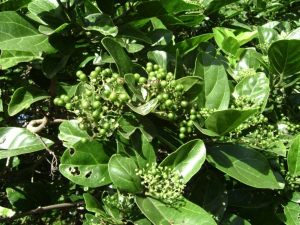Table of Contents
Agnimantha
Premna integrifolia – Ayurvedic Herb

Introduction
Agnimantha is a important plant during vedic period. It is the one among the Dhashamoolas. Its stem or sticks were used to produce fire. This plant is considered essential for rituals also, Agnimantha is best sothahara and vathahara drug. Like patala agnimantha is also found to be shothahara according to Charaka
VERNACULAR NAMES
English – Indian Headache tree
Hindi – Arni, Tekar
Kannada – Takkila
Malayalam – Munja
Tamil – Thalnaji
Gujarathi – Arni
Bengali – Ganimari
Telugu – Nelichett
HABITAT
Agnimantha is distributed throughout India. Mostly in drier part, upper gangetic planis, Uttarpradesh, Bihar, Orissa and other province.
Mostly found in the coastal areas in southern India, Kerala and Tamil Nadu and Western Coasts in dry regions. Flowering season in April and June. The wood in sometimes used for lighting fire by friction.[2]
It also found in Bangal & on the banks of Ganges. In hilly Regions from kumaan to Bhutan up to 15 thousands meter in sahyadri ranges and kongan.
PARTS USED
- Root
- Bark
- Leaf
- Panchanga
CHEMICAL COMPOSITION
The Root contains premnin, B sistesterol, triterpins, inorganic salts etc.
Leaves contain B sistosterol, lutoelin etc.
phelandrine, premnine, betulin, graiarine, ganikarine, caryophellen, premnenol, premna spirodeine etc also precent.
PROPERTY
Rasa : Tikta, Katu, Kashaya, Madura
Guna : Lagu, Raksa
Virya : Usna
Vipaka : Katu
Karma : Kapha–vatahara, Sothahara,Dipana, Pacana
DOSHAGNATHA
Dosa – Kapha vathahara by ushna veerya.
PRAYOGA
- Shotha
- Pandu
- Vasameha
- Sitapitta
- Udara
- Kotha
- Sthoulya
- Granthi
- Gandamala
- Vathavyathi
- Prameha
- Amavatha
- Nadisula
- Agnimandya
- Vibhanda
- Arsas
- Prathishyaya
- Jvara
- Kapharoga
- Urustamba
PHARMACO THERAPEUTIC ACTIONS AND USES
- EXTERNAL USES :-
- Drugs should be used in oilments associated with shotha and shoola. Hence warmed leaf be applied to these conditions and to sprains.
- Leaves are carminative and said to have galactoyour property.
- INTERNAL USES:-
- The decoction of the Root is said to be a cordial stomachic and useful in lives disorders.
- The decoction of the leaves is used in the treatment colic and flatulence white that of the tender plants used for Rhematism.
- Leaves Rubbed along with pepper and administered in cold and fever, also in gonorroea and during convalescence from fever.
THERAPEUTIC USES
- In Sotha
Arani kashaya is mixd with water (boiled and cooled) and used both internally and externally.(G.N)
- In stolya:- Silajatu is to be given with Agnimantha swarasa.(Cha.su.21)
- Kaphajajvara :-Tak or Moola kwatha can given.
- Prathishaya:- putapaka with arani patra.That swarasa with sindava lavana&Tila(C.D)
- Prameha:- Moola kwatha is taken in internally.(S.S)
- Sheethapitha :-Root paste is applied as Lepa or Root grent with ghretha can apply.(C.D)
- Amavatha: – Moola choorna with honey
- Vasameha: – Agnimantha kwatha given in internally.(S.S.CI.11)
- upadamsa.: jaya patra kwatha (chakradhattha.upadamsa cikitsa)
Udara roga:- oil is cooked with the kshara of either agnimantha,syonaka,palasa,stem of tila,bala,kadali,apamarga can given internally(cha.s.chi)
FOLKLORE USES
- Leaves juice with pepper powder used in cold and fever
- Root juice and dry ginger given together in relives shavavegas
- Root powder along with honey used in pradishays
- Warmed leaf applied in shoola
- Leaf juice is used in fever
- Root paste is should be given internally to eliminate kapha.
- Root decoction used in premeha.
RESEARCH STUDIES
Stem bark of premna integrifolia decreases force of contraction of heart and produce dilatation of pupil (GIMP)
A compound isolated from root bark as active against gram positive organisms. (Naturwiss, 1964, 51, 484)
External application of the alcoholic extract of the leaf also reduces the oedema (Krishnamurthy et.al.1972)
DOSAGE
Moola choorna – 1-3 g
Kwatha – 50-100ml
Patra swarasa – 10-20 ml
FORMULATIONS
- Agnimantha kasaya
- Dasamoolarishta
- Dasamoola Rasayanam
- Dasamooladi kashaya
- Dasamoola kadutraya kashayam
- Dasamoola viswathi kashayam
- Yogadvayam
- Panchamooladi kashayam
- Dasamoola ghritha
- Danwantharam tylam
- Narayana tylam
- Dasamoolashatpaleka ghritha
- Dasamooladi lehyam
- Indukantam ghrtha
- Gorocunadi vati
- Danwantharam ghrta
CONTROVERSIAL STUDY
The tree with which fire was lighted in the sacrificial cremonies by rubbing the sticks or wood together. This is the literal meaning of the word agnimantha. Controversy about Agnimantha is basically due to its variety. This is 2 kinds. (1) Laghu (small) (2) Vradha (Big). In charaka both are given as separate tree.
(1) Agnimantha (2) Tarkari.
Agnimantha is called by some to be laghu type while Tarkari is big tree.
Laghu agnimantha is clerodendrum phlomidis, while Brahat agnimantha is premna intergrifolia. Both belong to same family more of less height.
In south premna has been in use by vaidyas. In Gujarat and North cleroclendron is in use.
In varunadi gana susratha, both agnimantha and Tarkari are there; which means both are separate trees

Which is the tree among the both used for fire was lighting in the cermonies
is it AGNIMANTHA OR TARKARI? CAN YOU PLEASE SPECIFY THE BOTONICAL NAME OF TARKARI TREE